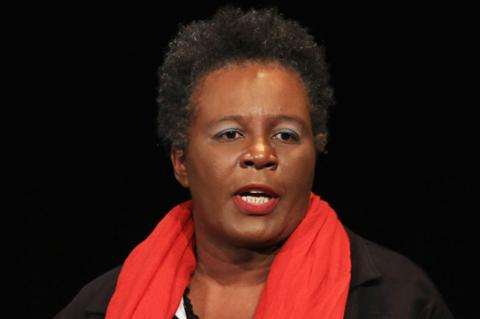by The roving annual conference of MFA literary culture known as AWP (for “Association of Writers and Writing Programs”), landed yesterday in Los Angeles. In contrast with the trade-oriented BookExpo, indie-heavy AWP is known for its vibe of support, confidence building, and opportunities to dance with purple-haired poets to a DJ set by Roxane Gay. (Sample panel: “Networking for Introverts.”) But Thursday evening’s keynote speaker,Claudia Rankine, is better known for broadsides than bromides. Her stated topic was “what keeps us uncomfortable in each other’s presence” at the book fair, or, more specifically, what she sees as persistent racial tokenism in MFA workshops. Her most conciliatory note came at the end, and it was aimed not at the many hundreds of writers and teachers sitting rapt in the L.A. Convention Center’s vast auditorium, but at the millions of people currently falling for Donald Trump.
Rankine rose to literary fame with Citizen, 2014’s well-timed amalgam of poetry, essay, and Serena Williams analysis, which on the heels of Black Lives Matter achieved something extremely rare by making it onto theTimes nonfiction best-seller list. There are 150,000 copies in print, a feat proudly noted before her talk last night by David St. John, the head of Rankine’s English department at USC. You don’t hear a lot of crowing over sales figures at AWP. “But as you well know that’s not enough copies because every person in this country needs to read Citizen,” said St. John, before imploring the audience to “rise up out of your seats” and greet Rankine.
Elegant and warm in a thick violet scarf and a green-embroidered shrug, Rankine opened funny, showing off slides of L.A.’s best sights — Randy’s Donuts, the Museum of Jurassic Technology, and her own lush backyard — before moving on to say that even many MFA courses that have diversified student bodies “have successfully tokenized a person of color, objectified, exploited and disregarded her all at once.” One of her raucous applause lines: “Unintentionally discriminating is as bad as intentionally discriminating because the result is the same.”
By way of illustration, Rankine read out loud an email sent to her by an (anonymous) African-American student who was thinking of leaving his or her program because they were told that “certain life experiences are said to belong to sociology and not to poetry, and that to write beyond the imagination’s notion of normality is to write political poetry, sociology, identity politics poetry, protest poetry — many labels but none of them poetry. For in order for poetry to be poetry,” Rankine continued, “white readers must find it relatable, and only then can it transcend its unrelatable colored writer.”
Rankine is celebrated for straddling genres — Citizen was nominated for National Book Critic Circle Awards in both poetry and criticism — and beneath her familiar critique of the “privilege of white dominance” was the notion that separating writing from politics is itself an act of exclusion. “When a student takes time to point this out by stating the simple facts,” she said, “that student is often read by white writers in positions of authority as problematic and ungrateful.”
She went on to offer an example of what “some of you white people” could do to at least make “race acknowledgment” part of their worldview. She read a poem by the white poet Joshua Weiner*, “Cloak,” about a childhood summer day, and then his own lengthy revision (inspired by Rankine), which reinstated a black friend he’d had at the time — as well as the backdrop of school busing in late-'70s Trenton — thus turning an amorphous elegy into a many-layered political critique.
Then, unexpectedly, Rankine turned the revisionist impulse on herself. “I thought about who wasn’t represented in my own work, and who I had little contact with in my own life. The answer was poor working-class white people,” those who were not thinking about inequities in pedagogy. So she wrote a poem about it, called “Sound and Fury” — a portrait of the Trump voter as a cast-aside worker — which she read to the silent audience in its entirety. Included was a litany of economic woes — “foreclosure, vanished pensions, school systems in disrepair, free trade” — though most in the room were probably most familiar with the last: “debt.” She spoke of seeing “hands which assembled and packaged and built harden into a fury that cannot call power to account,” because “White can’t strike its own structure. White can’t oust its own system.”
“Sound and Fury” concluded, “In daylight this right to righteous rage doubles down the supremacy of white in this way.” Rankine then ended the talk by revising herself again — changing the last three words. Now they read, “in our way,” because racism is everyone’s problem — even those lucky enough to experience it in poetry workshops rather than depressed factory towns or on the wrong end of a police officer’s gun.


Spread the word